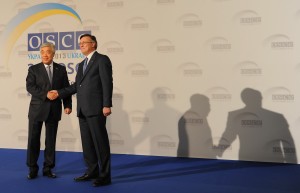 KYIV – Minister of Foreign Affairs of Kazakhstan Erlan Idrissov participated in the 20th meeting of the Council of Foreign Ministers of the Organisation for Security and Cooperation in Europe (OSCE) in the Ukrainian capital on Dec. 5-6, urging fellow participating states to continue working towards a united and indivisible security in the Euro-Atlantic and Eurasian space as called for in the Astana summit declaration three years ago.
KYIV – Minister of Foreign Affairs of Kazakhstan Erlan Idrissov participated in the 20th meeting of the Council of Foreign Ministers of the Organisation for Security and Cooperation in Europe (OSCE) in the Ukrainian capital on Dec. 5-6, urging fellow participating states to continue working towards a united and indivisible security in the Euro-Atlantic and Eurasian space as called for in the Astana summit declaration three years ago.
In his opening statement, Idrissov thanked Ukraine for the meeting’s organisation, praising the host country’s “realistic and pragmatic approach” and the successful achievement of their goals during their one-year chairmanship of the organisation.
Idrissov also outlined Kazakhstan’s plan for its key activities within the OSCE in the coming years. He called on participating states to continue implementing the provisions of the declaration adopted at the OSCE summit in Astana, which is one of the few political statements unanimously endorsed by all members of the organisation.
“The most recent OSCE summit, held in 2010 in Astana, adopted a declaration that outlined the current priorities of the organisation, highlighting its three dimensions equally. The Astana Declaration creates a vision for a security community designed to search for answers to current challenges. It should unite all OSCE participating states in the Euro-Atlantic and Eurasian space without dividing lines, conflicts, spheres of influence or zones with different levels of security,” he emphasised.
Idrissov underlined that almost 40 years after the signing of the Helsinki Final Act, which created the original Conference on Security and Cooperation in Europe (CSCE) in 1975, the document has not lost its relevance and continues to positively impact regional and global politics. “We believe the Helsinki+40 [process] should be focused on implementing the Astana Declaration to construct a united and indivisible security community in which different regional organisations can interactively resolve problems in this area.”
He also updated his colleagues from 57 participating states and 11 partnering states on the continuing implementation of provisions of the Astana Declaration in the political, military, economic, environmental and humanitarian spheres.
According to Idrissov, one of the important aspects of the organisation’s work is its collaboration on Afghanistan.
The foreign minister also welcomed Switzerland and Serbia’s upcoming chairmanships in 2014 and 2015, expressing hope for continued fruitful and effective work.
With regard to the unfolding political situation in Ukraine, Idrissov stressed that Kazakhstan has always been a supporter of integration processes.
“However, our country believes that the political choice of the development model of each country, including the choice of forms of integration, is the sovereign right of the country and should be based primarily on its own national interests,” he said.
Idrsissov also noted that Kazakhstan welcomes Ukraine’s interest in integration within the Customs Union and the Eurasian Economic Space, though, he said, “we do not think that this interest somehow prevents the natural search for opportunities of integration in other directions.”
During the two-day visit, Idrissov met Lamberto Zannier, OSCE secretary general, and discussed Kazakhstan’s cooperation with the organisation, including over the concept of the Euro-Atlantic and Eurasian Security Community, cooperative action in dealing with transnational threats and settling the situation in Afghanistan. He also noted the relevance of Zannier’s OSCE Security Days initiative, which was launched in 2012. According to the minister, the Security Days provided a good platform for exchanging views on the OSCE’s military and political agenda.
With UN Undersecretary General for Political Affairs Jeffrey Feltman, Idrissov discussed creating a UN regional hub in Almaty, the activities of the United Nations Development Programme (UNDP) and mechanisms for providing humanitarian assistance to the countries of the region.
With the new OSCE High Commissioner on National Minorities Astrid Thors, Idrissov discussed Kazakhstan’s cooperation with the institute she leads. He noted the importance of maintaining and developing Kazakhstan’s model of tolerance in its multi-ethnic and multi-confessional society, and emphasised that Kazakhstan’s historical experience could be useful for other countries. Idrissov called on Thors to support President Nursultan Nazarbayev’s initiative to develop the “Towards Tolerance in the New Decade” OSCE document and invited the high commissioner to visit Kazakhstan in 2014.
At meetings with heads of foreign delegations, including representatives of the European Union, the U.S., Switzerland, Finland, Croatia, Spain, Norway, Latvia and other countries, Idrissov discussed the key priorities of the country’s Kazakhstan 2050 Strategy, the participation of foreign businesses and governments in EXPO 2017 in Astana, the support for Kazakhstan’s candidacy for the non-permanent seat on the UN Security Council for 2017-2018, as well as opportunities for attracting investment and new technologies and liberalising visa requirements for Kazakh citizens.
